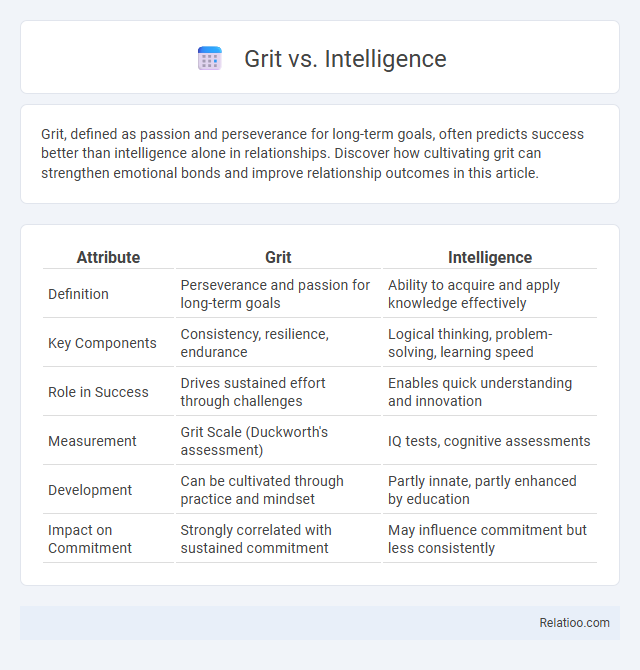Grit, defined as passion and perseverance for long-term goals, often predicts success better than intelligence alone in relationships. Discover how cultivating grit can strengthen emotional bonds and improve relationship outcomes in this article.
Table of Comparison
| Attribute | Grit | Intelligence |
|---|---|---|
| Definition | Perseverance and passion for long-term goals | Ability to acquire and apply knowledge effectively |
| Key Components | Consistency, resilience, endurance | Logical thinking, problem-solving, learning speed |
| Role in Success | Drives sustained effort through challenges | Enables quick understanding and innovation |
| Measurement | Grit Scale (Duckworth's assessment) | IQ tests, cognitive assessments |
| Development | Can be cultivated through practice and mindset | Partly innate, partly enhanced by education |
| Impact on Commitment | Strongly correlated with sustained commitment | May influence commitment but less consistently |
Understanding Grit: Definition and Key Traits
Grit combines passion and perseverance toward long-term goals, emphasizing sustained effort despite challenges. It differs from intelligence, which measures cognitive ability, by focusing on resilience and determination. Key traits of grit include consistency, resilience, self-discipline, and a growth mindset that fuels persistence beyond innate talent or initial effort.
Intelligence Explained: Types and Measurement
Intelligence encompasses various types, including fluid intelligence, which involves problem-solving and adaptability, and crystallized intelligence, referring to accumulated knowledge and skills. Measurement of intelligence commonly employs standardized IQ tests, such as the Wechsler Adult Intelligence Scale (WAIS) and the Stanford-Binet Intelligence Scales, assessing verbal comprehension, working memory, and processing speed. Understanding these distinct intelligence types and their measurement helps clarify individual cognitive strengths beyond grit and effort, highlighting the complexity of human ability.
The Science Behind Grit and Academic Achievement
Research in educational psychology reveals that grit, defined as perseverance and passion for long-term goals, significantly predicts academic achievement beyond raw intelligence. Studies using longitudinal data show that students with high grit levels consistently outperform peers in GPA and graduation rates, emphasizing sustained effort over innate cognitive ability. Neural imaging also suggests that grit-enhanced motivation activates brain regions associated with self-regulation and executive function, further supporting its critical role in academic success.
Intelligence: Is It Fixed or Can It Grow?
Intelligence is not fixed and can grow through neuroplasticity, which allows the brain to form new connections and adapt to learning experiences. Research shows that deliberate practice and challenging tasks enhance cognitive abilities by strengthening neural pathways, indicating that your intelligence can improve with consistent effort and effective strategies. Understanding this growth mindset empowers you to embrace challenges and persist in developing your intellectual potential.
Grit vs Intelligence: Analyzing Success Stories
Grit often outperforms intelligence in long-term success stories, with perseverance and passion driving achievement more than raw cognitive ability. Studies reveal that individuals with high grit levels consistently overcome challenges where intelligence alone falls short, emphasizing sustained effort over innate talent. Your ability to cultivate grit can significantly enhance productivity and goal attainment beyond relying solely on intellectual prowess.
How Grit Influences Long-term Goals
Grit plays a crucial role in achieving long-term goals by fostering persistence and resilience despite challenges or failures, which intelligence alone cannot guarantee. Your consistent effort and passion, fueled by grit, enable you to overcome obstacles and maintain progress toward complex objectives over extended periods. Research shows individuals with higher grit levels are more likely to reach success because they sustain motivation and adapt strategies rather than giving up when faced with setbacks.
The Role of Intelligence in Problem-Solving
Intelligence plays a critical role in problem-solving by enabling you to analyze complex information, identify patterns, and generate effective solutions quickly. While grit motivates persistence and effort fuels consistent practice, intelligence supports the cognitive processes needed for understanding and adapting to challenges. Balancing your intellectual abilities with sustained effort maximizes problem-solving success.
Grit and Intelligence in Career Development
Grit plays a crucial role in career development by sustaining your perseverance and passion through challenges, often outweighing raw intelligence in long-term success. While intelligence provides the foundational problem-solving skills and adaptability needed in complex tasks, grit ensures consistent effort and resilience, which drives continual growth and achievement. Prioritizing the cultivation of grit alongside leveraging your cognitive abilities can accelerate professional advancement and skill mastery.
Cultivating Grit and Enhancing Intelligence
Cultivating grit involves developing resilience and sustained passion for long-term goals through deliberate practice and goal setting, which enhances perseverance despite challenges. Enhancing intelligence can be achieved by engaging in complex problem-solving tasks, continuous learning, and neuroplasticity exercises that improve cognitive functions such as memory and reasoning. Combining grit with intelligence and consistent effort leads to higher achievement and personal growth by leveraging both mental adaptability and unwavering commitment.
Grit vs Intelligence: Which Matters More?
Grit, defined as perseverance and passion for long-term goals, often outweighs raw intelligence in achieving success, as sustained effort drives progress despite obstacles. Studies reveal that individuals with high grit consistently outperform those with higher IQs but lower persistence in various fields, from academics to entrepreneurship. Fostering grit cultivates resilience and adaptability, crucial traits that intelligence alone cannot guarantee in overcoming challenges.

Infographic: Grit vs Intelligence
 relatioo.com
relatioo.com